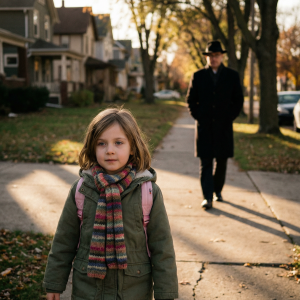The Willow Creek Diner perched along Highway 29, serving as a beloved rest stop for long-haul drivers, road-trippers, and townspeople. Walk in any morning and you’d find the aroma of brewing coffee hanging in the air, silverware clinking against ceramic plates while hushed voices created a steady hum of background noise.
This morning buzzed with energy. A cluster of high schoolers occupied a corner table, their laughter punctuating the air. A young family demolished tower-high pancake stacks. And positioned near the counter sat an elderly gentleman sporting pristine white hair, slightly stooped over a bowl of steaming oatmeal.
Henry Collins, age eighty, was no stranger to the locals. He consistently dressed in crisply ironed button-downs, gleaming dress shoes, and a fedora he’d courteously tip toward anyone catching his eye. While respected throughout town, his history remained largely unknown.
The entrance bell chimed as a motorcyclist strutted through the doorway. Somewhere in his mid-twenties, he sported a worn leather jacket, heavy chain-laden boots, and carried his helmet casually under one arm. He radiated that untamed, volatile energy that draws people in or pushes them away. Striding confidently inside, he surveyed the space before claiming a stool mere feet from Henry.
“Coffee,” he demanded of the server. Then, casting a sideways glance at Henry, his lips curled into a sneer.
“Would you look at that,” he announced, volume cranked high enough for surrounding tables to catch every word. “Never knew relics got released from museums for morning meals.”
Scattered nervous laughter echoed through the space, though most customers suddenly found their plates fascinating. Henry quietly raised his spoon, stirred slowly, and remained silent.
The biker pushed further. “Hey, gramps,” he continued. “Bet those dentures can’t handle anything tougher than mush.” He slapped the counter, amused by his own wit.
Henry finally lifted his gaze. Those blue eyes—still piercing despite age-worn features—locked onto the younger man’s face. His tone stayed measured, controlled. “Young man,” he stated calmly, “showing respect costs you nothing. Losing it, however, will cost you everything.”
The biker hesitated, briefly caught off-guard. But his cocky grin quickly returned, dismissing the comment. “Respect? Why would I respect you? You’re just some relic taking up oxygen.”
Henry placed his spoon down, folded his napkin precisely, and gradually rose from his seat. Momentarily, onlookers assumed he’d surrender and leave. Instead, he extracted a crisp twenty-dollar bill from his coat, placed it deliberately on the counter, and straightened his posture.
“Young man,” Henry repeated, “I’ve walked this earth longer than you’ve drawn breath. I’ve labored harder than you’ve ever imagined. And I’ve accumulated more battle wounds than you’ve collected tales. Never confuse years with frailty.”
Complete silence descended. The biker forced a laugh, but Henry’s unwavering stare clearly rattled him.
Then came the unexpected twist.
The cook, who’d been observing through the kitchen window, emerged while wiping flour from his apron. “Henry?” he called out. “Should I fill him in?”
Henry declined with a head shake. “Unnecessary.” He redirected his attention to the biker. “Perhaps I’ll demonstrate instead.”
He strode past the younger man toward the exit. Briefly, it appeared he actually intended to leave—until an engine’s distinctive rumble resonated from outside. Moments later, Henry reentered. Every patron pivoted to observe.
Positioned directly outside the window, catching morning sunlight, sat a magnificent vintage motorcycle—brilliant chrome, flawless paint job, burnished leather saddle. Despite predating the biker by decades, every component gleamed immaculately.
“That machine,” Henry declared, gesturing through the glass, “is a 1948 Indian Chief. Rebuilt it personally, component by component, across ten years. Piloted that beauty coast-to-coast when I matched your age. Did it twice. Nearly died once, but she carried me home.”
Astonished whispers rippled throughout the establishment. Even the biker pressed closer to the window, jaw dropping. That motorcycle was legendary.
Henry continued, maintaining his composed yet authoritative tone. “So when you swagger through that door believing you own the asphalt, understand this: the road existed long before you, and it’ll outlast you too. Respect doesn’t stem from volume or fashion choices. It emerges from how you conduct yourself and how you treat fellow travelers.”
Color flooded the biker’s face. He attempted speaking, but words failed him. His swagger evaporated before the audience.
Then Henry delivered another surprise. He retrieved his wallet and extracted a weathered photograph. He offered it to the younger man. The image captured a twenty-something Henry—unmistakably him—mounted on that identical motorcycle, flashing a wide grin, hair windswept and wild.
“I occupied your shoes once,” Henry said gently. “Reckless, defiant, convinced I possessed all the answers. But experience taught me. Hopefully you’ll learn too—before circumstances force harder lessons.”
The biker studied the photograph, his Adam’s apple bobbing as if choking on unspoken apologies. Eventually, he extended it back toward Henry. “I… I wasn’t trying to—”
Henry reclaimed the photo, tucked it away, and offered a slight nod. “Perhaps not intentionally. But you won’t forget today.”
Weighted silence lingered briefly. Then the biker stood, tossed wrinkled cash on the counter for his abandoned coffee, and mumbled, “Impressive bike,” before exiting.
The bell announced his departure. Through the window, everyone observed him pause beside Henry’s motorcycle. He didn’t make contact—simply studied it thoughtfully before moving to his own machine and departing.
Inside, conversations gradually resumed. The pancake family whispered about the valuable lesson their children just witnessed. The teenagers exchanged meaningful looks, suddenly subdued.
Henry reclaimed his seat, methodically finished his oatmeal, and tipped his server generously.
As he prepared to leave, the cook patted his shoulder affectionately. “You’ve always handled these situations perfectly, Henry.”
Henry’s smile emerged faint but genuine. “Not handled, Tom. Educated. Significant distinction.”
With that, he positioned his fedora carefully atop his head, stepped into brilliant sunshine, and mounted the Indian Chief. The engine awakened with a deep, steady purr, capturing every diner patron’s attention.
As Henry cruised down Highway 29, the image of that eighty-year-old astride a machine predating most spectators would resonate far longer than the biker’s mockery ever could.
Because during those brief minutes at the Willow Creek Diner, everyone absorbed a crucial truth: respect transcends age, volume, or posturing. It radiates from character. And occasionally, the softest voice commands the greatest authority.
Note: This narrative draws inspiration from authentic events and individuals but has been fictionalized for storytelling purposes. Names, personalities, and specifics have been modified to preserve anonymity and strengthen the narrative arc. Any similarities to real people, whether living or deceased, or actual occurrences remain purely coincidental and unintentional.





